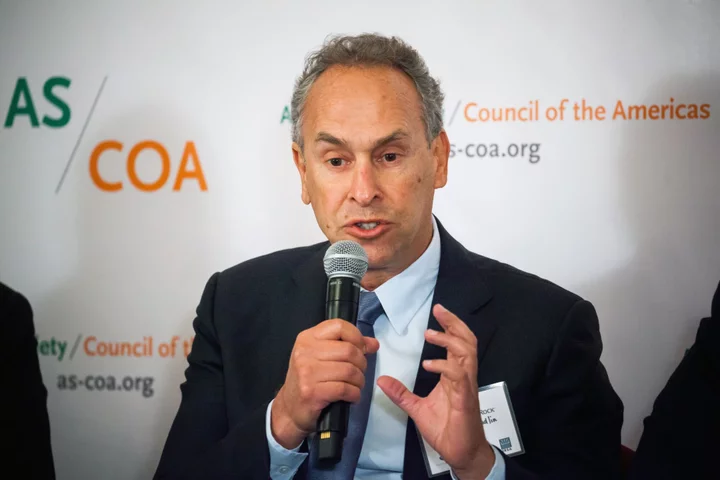To get to Marcelo Mindlin’s desk in his downtown Buenos Aires office, guests must walk past a big steel ring — a cross-section of natural gas pipeline.
The hunk of metal epitomizes the views of Mindlin, and Argentina’s leaders, on the future of energy: Even as electrification gathers speed, fossil fuels will be needed for decades to come.
Argentina is home to the world’s second-biggest trove of shale gas in Patagonia’s Vaca Muerta, or Dead Cow, formation. Mindlin, 59, who founded Pampa Energia SA in 2005 as the country rebounded from financial and economic implosion, wants to unearth as much of it as possible.
“We think that natural gas is the fuel for the transition,” Mindlin said in an exclusive interview recently at his chairman’s suite with sweeping views out to the River Plate estuary. “I don’t think the world can go to green energy in 20 years. That’s a fantasy.”
Pampa’s bet on fossil fuels comes as Argentina reckons with a pivotal presidential election on Oct. 22. The surprise favorite, libertarian Javier Milei, denies climate change is caused by human activity. His two main rivals also support oil and gas drilling because it’s key to bolstering the country’s fragile trade balance.
Pampa’s stock has climbed steadily over the last four years as a leftist government, better known for turning off investors, rolled out policies to support Vaca Muerta in a bid to overcome a series a false dawns and bring Argentine shale to global markets once and for all.
New York-traded shares have recovered to $41 since slumping to about $10 after the coronavirus pandemic compounded the fallout of Argentina’s failed experiment with market-friendly policies, including the deregulation of energy markets, under Mauricio Macri.
Mindlin gushed over the innovative way in which the chunk of pipeline by his desk had been welded. The automated process recently helped his construction company, Sacde, and its partners to lay down Argentina’s first major gas duct in decades in just a matter of months.
Now Pampa, which Mindlin has nurtured into one of resource-rich Argentina’s top energy producers, is spending big to help fill the 356-mile (573-kilometer) pipeline and take shale gas across the country to cities and industry centers. Its investments in wells will jump 52% this year to nearly half a billion dollars.
That sort of expansion is tough in Argentina, where inflation is running at 138%. Energy companies like Pampa are particularly hard-hit because revenues linked to a tightly controlled exchange rate often struggle to match soaring costs, especially salaries that Pampa has to review every two months.
Mindlin said the next government must make beating down inflation its No. 1 priority since it’s the only way to win breathing room for other reforms. Then he insisted on tapping shale riches: “In our own areas we can drill 2,200 wells and so far we’ve done only 40, so 2% — and that’s more or less the same situation everywhere.”
Oil companies from Chevron Corp. to local outfits like YPF SA argue that natural gas is best-placed to swiftly and relatively cleanly satisfy growing global energy demand.
“We have to find windows to make the energy transition orderly — we shouldn’t try to do it overnight,” YPF’s finance chief, Alejandro Lew, said at a recent Bloomberg conference.
Argentina has a vested interest: It suffers perennial shortages of hard currency that’s left it lurching from crisis to crisis. Becoming a net exporter of natural gas, rather than an importer, will help solve the problem.
For now, exports are small and come by way of pipeline to neighboring Chile. Brazil is a future target. Meanwhile, Pampa, via its stake in natural gas company TGS SA, is lining up construction of Argentina’s first liquefaction plant for seaborne shipments further afield.
As well as producing a chunk of Argentina’s natural gas, Pampa also channels a lot of it to power plants, making it one of the country’s biggest electricity generators.
Today, Mindlin’s 17% stake in Pampa is worth about $360 million, based on the market value of the company’s New York-traded shares to strip out local currency distortions. There’s also Sacde and an investment in insurance firm Origenes, which specializes in retirement.
It’s a domestic energy empire Mindlin has built over nearly two decades — ever since he split from real estate partner Eduardo Elsztain — and that he supercharged in 2016 by acquiring assets from Brazil’s Petrobras.
But it’s an empire with a family feel. His brother, Damian, is a partner in all of Marcelo’s lines of business, while son Nicolas was appointed Pampa’s CFO two years ago. Chief Executive Officer Gustavo Mariani, 53, was a teenager when he started working with Mindlin.
To be sure, Pampa has been investing in wind farms after Argentina set a target last decade, enshrined in law, of meeting 20% of energy demand with renewable sources by 2025.
The rate was about 14% last year. But development of renewables has waned in recent years because of bottlenecks with both financing — Argentina imposes strict restrictions on money flows — and transmission. Even if international lenders did invest in new wind or solar projects, there aren’t enough high-voltage power lines to support them.
Pampa’s capacity to produce renewable power pales in comparison to its gas-fired portfolio. It even recently financed the purchase of a shale oil stake by trading one of its wind farms in an asset swap. And unlike other local drillers, Pampa is loath to move into Argentina’s vast deposits of lithium for making batteries because it doesn’t want to spread resources too thinly.
“If I want to go everywhere there’s an opportunity, I would weaken myself,” Mindlin said. “We have so much to do in Vaca Muerta.”
--With assistance from Caroline Salas Gage and Daniel Cancel.

